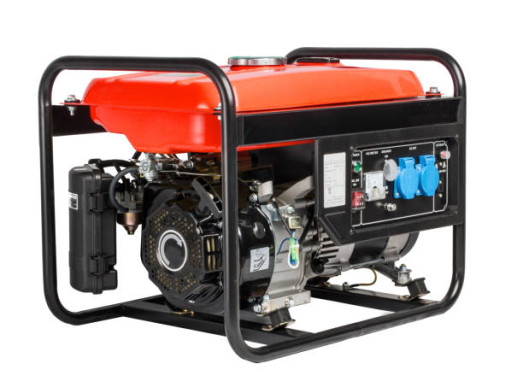- 5952
- 1
Sharing Ideas and Updates on LPG in Nigeria and related information to enable effective collaboration within the LPG Value Chain
Safety Precautions And Guidelines For Gas-Powered Generators.

The removal of fuel subsidies in Nigeria has led to a significant increase in fuel prices, posing challenges for both individuals and businesses. In light of this situation, many people and companies in Nigeria are turning to gas-powered generators as a viable alternative. By utilizing Liquefied Petroleum Gas (LPG) for generators, there are notable economic advantages. However, it is crucial to prioritize safety during the conversion process and when operating these generators.
Economic Advantages of Gas-Powered Generators:
a) Cost savings over time: Conversion to gas power can result in approximately 40% reduction in expenses compared to using petrol or diesel.
b) Comparative analysis of cost and consumption rates between gas and petrol generators.
c) Potential for long-term savings for households, businesses, and industries.
d) Contribution to reducing expenses for top listed firms and their total production costs.
Conversion Process and Cost Considerations:
a) The conversion of existing generators: Replacing the fuel carburettor with a hybrid carburettor that allows the generator to function on both petrol and gas.
b) Price disparity due to imported components and associated factors.
c) Cost breakdown for conversion kits and cylinder setup.
d) Consideration for different engine types and the compatibility of existing conversion kits.
Environmental Benefits and Sustainable Development:
a) Reduced emissions compared to fuel-powered generators.
b) Alignment with Nigeria's commitment to combat climate change and achieve sustainable development goals.
c) The potential of LPG as a clean source of energy for generators, tricycles, and vehicles.
Safety Precautions and Guidelines:
The utilization of Liquefied Petroleum Gas (LPG) in combustion engines, such as gas-powered generators, requires strict adherence to safety precautions to prevent potential hazards. While gas-powered generators offer cost savings and environmental benefits, it is essential to prioritize safety throughout the conversion process and during operation. The following guidelines outline key safety precautions to ensure safe and efficient use of gas-powered generators in Nigeria:
Selection of Qualified Technicians:
Engage the services of qualified technicians with expertise in generator conversion and LPG systems.
Verify the technician's knowledge and experience in adhering to recognized safety standards.
Avoid patronizing untrustworthy sources lacking proper knowledge or experience.
Compliance with Connection Standards and Regulations:
Select appropriate conversion kits tailored for the specific engine being converted.
Ensure the conversion kit aligns with the correct connection standards and regulations.
Use regulators and components that meet recognized safety standards to maintain system integrity.
Handling and Installation:
Ensure correct handling and installation of gas-powered generators by following proper procedures.
Verify the compatibility of the generator and the conversion kit to prevent potential issues.
Properly secure the generator to prevent vibration-induced movement, especially for older generators.
Avoid placing the generator near combustible materials and maintain a reasonable separation distance between the engine and the gas cylinder.
Use of Regulators with Excess Flow Shut-off Valves:
Opt for regulators equipped with excess flow shut-off valves to detect unusual gas flow or hose disconnection.
The shut-off valve prevents gas from flowing freely, minimizing potential risks and hazards.
Regular System Inspections:
Conduct periodic inspections, especially for outdoor installations exposed to sunlight and harsh weather conditions.
Perform leak tests to ensure the integrity of the LPG system and detect any potential gas leakage.
Replace cylinders as needed, using this opportunity to verify proper working order and address any issues.
Proper Storage and Handling of Gas Cylinders:
Store gas cylinders in well-ventilated areas away from direct heat sources, flames, or ignition points.
Avoid storing cylinders in confined spaces or areas prone to excessive heat or moisture.
Handle cylinders with care, ensuring they are kept in an upright position and properly secured to prevent tipping or damage.
Training and Education:
Educate users and operators about the safe operation of gas-powered generators, including proper start-up and shutdown procedures.
Provide training on the detection of gas leaks, emergency response protocols, and evacuation procedures.
Promote awareness of potential risks and the importance of safety precautions among users.
The adoption of gas-powered generators in Nigeria offers significant cost savings and environmental benefits. However, ensuring safety throughout the conversion process and operation is of paramount importance. By following the recommended safety precautions and guidelines, the risks associated with gas-powered generators can be minimized. Responsible installation, proper handling, regular inspections, and adherence to recognized safety standards are crucial for the safe operation of these generators.
By prioritizing safety, gas-powered generators can provide reliable and cost-effective energy solutions while contributing to Nigeria's sustainable development goals and reducing greenhouse gas emissions. Adhering to the recommended guidelines, such as selecting qualified technicians, using regulators with excess flow shut-off valves, and conducting regular system inspections, will help mitigate potential hazards and ensure the safe operation of gas-powered generators.
















Vera
30 July 2023 - 10:13pmIs this really save enough knowing our behaviour of I don’t care attitude if no maintenance culture? Is Using ordering cooking gas okay please? Then, what is the distance between the gas cylinder and the generator?Thanks.
Reply